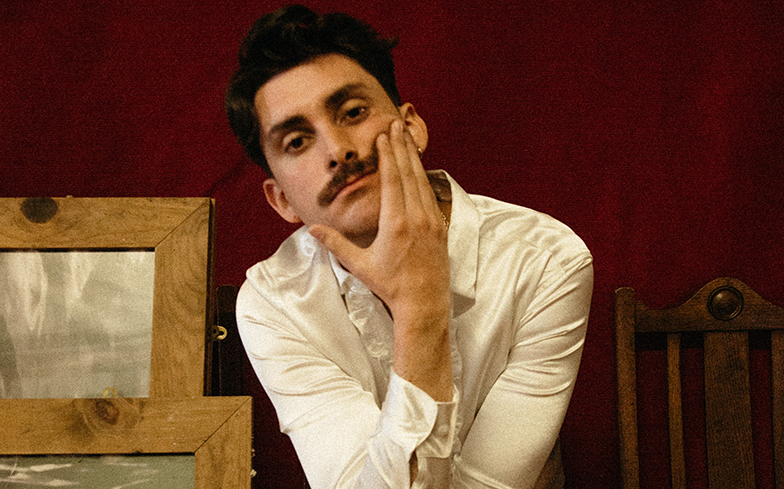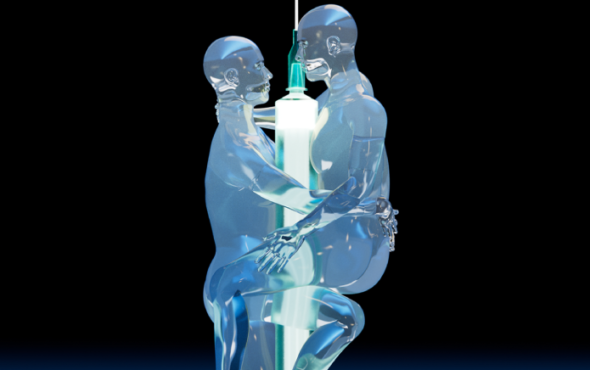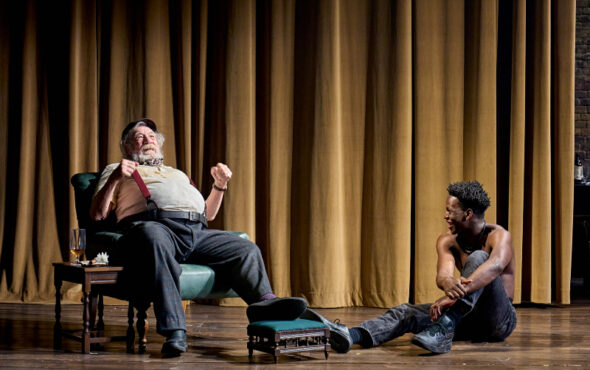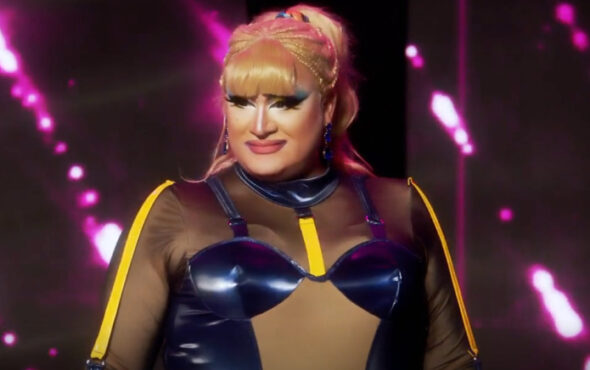
Tim Chadwick is back with another sad banger.
The Irish singer is kicking off 2020 with a new single called Sore Thumb, a sombre track with a powerful chorus that tackles anxiety, the insecurities of being an outcast and the search for validation.
Those feelings are all-too-familiar for people in the LGBTQ community, many of whom spend their teenage years (and sometimes adulthood) hiding their true identities and trying to fit in with a heteronormative society.
“I was afraid that if I did come out – and this is pure internalised homophobia – that I wouldn’t be taken seriously. So for a long time I said nothing,” Tim tells GAY TIMES of his own struggles with being gay.
“But then I listen to those songs back and I don’t even believe me, so how was anyone else meant to believe me? Obviously if I use ‘he’ pronouns or talk about a relationship with another man it’s gonna spark conversation, and that’s also what I want.”
To mark the release of Sore Thumb, we spoke to Tim about his journey to accepting his sexuality, becoming an independent artist, and why it’s so important that we speak out about mental health struggles.
Why did it feel right to kick off 2020 with Sore Thumb?
Last year, for a number of reasons, I was only able to release one song and it was great for me, but I feel like I was only getting started. Just as that song came out people were calling it a ‘sad banger’ and I’d never heard that before, so I was like, ‘Yeah, that is exactly what the song is’. When I was recording Sore Thumb I was like, ‘If this isn’t a sad banger, I don’t know what it is!’ It’s that resurgence of emo-pop we’ve seen lately. There’s other songs under my belt, but for some reason this felt like the right one.
The song deals with those feelings of being an outcast and not fitting in – is this something you’ve always struggled with?
Yeah, I think I’ve silenced myself quite a lot in trying to be everything to everyone, definitely throughout school and college just so that I wouldn’t stick out. So if you want me to have these interests, sure I’ll have them, if you want me to talk a certain way or look a certain way, I’ll do that. And it got to a point where I realised it was doing nothing for me, it was just for everyone else, and there’s a line in the song, ‘I’m not standing for the erasure anymore’, and I guess that’s what I wanted the song to be about.
It does feel like anxiety and mental health are things that people are more willing to talk about now, especially for men who historically have been told to ‘man up’ and suffer in silence. Why do you think it’s so important to be honest and open about these topics?
I think it’s because that’s what music is all about, for me at least. I know people listen to music in many different ways, but for me I like to go to shows or listen to a full album because the person knows exactly how I’m feeling or what I’m going through. That’s the serotonin hit I get from music because it’s like, ‘Oh, all those thoughts in my head, here’s someone singing about it, that makes sense now’. As for men, I think that goes back years, it’s the role play where you have to be the strong one and hold everything back. I’ve always been emotional but I don’t think I was able to portray that in music for a long time. It’s becoming more important because the world is a bit of a shit show, and it’s seeing the worst it’s ever seen, and yet here you have a small glimmer of hope with people reaching out and speaking out about their struggles in their art. You can scroll through Twitter all you want, but for someone to actually put it into their art means more.
These feelings of being an outcast, a lot of people experience that but especially LGBTQ people because they spend a lot of their lives denying who they are and trying harder to fit in. You’re out and proud now, but was there ever a time you felt you had to hide who you were?
Oh yeah, 100%. For a while I just thought, ‘This is my life, and I’ll never be able to tell anyone’. I didn’t even know how to go about living as a gay man, it wasn’t like, ‘I can’t wait to be free and do all the things I want to do’ because I didn’t know what I wanted to do. Coming out is different for everybody, and I was lucky that I was totally accepted, and everyone was like, ‘This is amazing, now you can be who you want to be’, but if you’ve suppressed who you are for so long you kind of lose who you want to be. So when I came out I was actually struck with a lot more anxiety than I had before, because now there was this expectation that I would be my true and authentic self – but if you’ve never been that, how do you know what that is? I came out when I was 21, and it’s taken me until now – and you can see it in the music – to own my sexuality and finally be comfortable in a setting where everyone else is so proud and just being themselves. I tried to fit in to be straight and that didn’t work, so I was like, obviously I need to come out, but then it was like, ‘I don’t know how to act now’. It wasn’t that big euphoric coming out that I thought it would be. It was very much like, ‘Oh well now I have even more soul-searching and growing up to do’.

Some artists really embrace their queerness and consider it a significant part of themselves, but others have worried they’re going to be pigeon-holed as just a queer artist. Where do you fall on that line?
That is a tough and blurry line. Sometimes you do wonder if you’re being interviewed because of your music or just because of your sexuality and how you identify. For me, if the art is good, you should be celebrated as an artist first and then it’s up to the individual if they want to talk about their queerness or their experiences. But I know for me listening to music growing up, there were no gay people out there, and as I’ve gotten older I’ve realised that maybe part of my job is to… not to ‘throw it in people’s faces’, but just to drop it into everyday conversation. If all the other straight artists out there can use their pronouns, if men can sing about women and women can sing about men, it should just be thrown out there and not be a big thing. I do ask myself, ‘Is talking about it helping to normalise it, or is it pigeon-holing it?’ It’s a tough question that I do struggle with, because at the end of the day I’m absolutely honoured and delighted to have a chat with you, but it is because I identify as a gay man. It’s a tough one. But it should be celebrated and not just pigeon-holed. I was also afraid as well that if I did come out – and this is pure internalised homophobia – that I wouldn’t be taken seriously. So for a long time I said nothing. But then I listen to those songs back and I don’t even believe me, so how was anyone else meant to believe me? Obviously if I use ‘he’ pronouns or talk about a relationship with another man it’s gonna spark conversation, and that’s also what I want. It’s a tough question.
You opened up recently about being dropped by your label and going independent. How has that impacted on you and your music?
Oh it’s been the best thing ever. I was signed to a development deal quite young, and like I said earlier, I had a lot of growing up to do and things to figure out, I don’t think they knew I was gay. I got on with them great, we had a great relationship and we still do, but at the end of the day I was there for development, I developed as far as I could, and then it was like, ‘Okay, it’s time for you to spread your wings’ – which came at the best time ever. But you know, as an artist starting out, you look at the industry and you think that getting signed is great and being dropped is the biggest failure ever. But that’s just not true. Every artist I look up to has gone through the exact same thing. Now I’m able to focus on the excitement and how proud I am to own everything I’m about to do. I don’t have to try and please people who are thinking, ‘Will this be marketable?’ I look at this song that’s coming out, and in my head it’s not a radio song and I don’t know how to market it, but it’s what I wanted to do and there are so many artists I look up to who say the most important thing is that you love what you do, and you should be proud of the songs you put out – and that’s how I feel. It was a positive learning curve from what was just a tough life moment, and I have to talk about it because nothing annoys me more than people saying, ‘My life is great, look at all the amazing things I’m doing’. Because as honoured as I am to be an artist and release music, it’s tough out there, and I don’t wanna gloss over that.

In the age of Instagram people do like to present this amazing, sometimes photoshopped version of their lives, and that can play into mental health issues because others see that and think their own lives aren’t good enough.
Oh my god, some days I wish I never had Instagram. You find yourself just scrolling mindlessly and it’s like, this is part of my job and I have to promote myself, but for so long I tried to not shout about myself and I tried to hide certain parts of myself and now it’s my job to give off this air of confidence. So it’s definitely a fake it ’til you make it thing, in terms of confidence – and then when people say it’s good you get full-on imposter syndrome and you’re like, ‘Oh no, I don’t want it’. It’s a vicious cycle.
A lot of up-and-coming artists are choosing to stay independent or using services like AWAL to distribute while still keeping creative control. Do you think being independent is the future of music, with labels playing less of a role?
Labels will always be there for money. I was listening to an interview between Grimes and Zane Lowe, she said she loved being independent and he asked, ‘Oh, so you’re anti-label?’ And she was like, ‘Absolutely not, if a major label asked to sign me I would, but I would have to set out the parameters of the deal’. So right now, I get my music distributed by AWAL, and I’m excited to be an independent artist because the reigns are mine and the control is mine. It can come to a point where there are too many chefs in the kitchen all trying to get their point across. Now it’s just me and my manager, we work really closely together, and I’ll say, ‘This is it’, and he’ll say, ‘Okay cool’, rather than sending it round to a team – and don’t get me wrong, I love having a team of people to help out, but I’m also a control freak, so the more people involved the more the message gets lost. So going back to the Grimes thing, if someone was to come and say, ‘Here’s a really nice deal where we both benefit’, I would do it. A really interesting person who did that recently was Maggie Rogers, she signed to a major label but she got to keep her masters, and that’s like gold dust for an artist, because she’s signed to a major label but she owns all her music. It’s totally a power play and that only benefits the artist. I would like to do that one day.

How important has songwriting and music been in your own journey, especially through difficult times?
Oh my god, it’s everything. I think therapy is an absolutely amazing thing, but for me, I have therapy with myself when I sit down and write it out. I think everyone can agree that with the absolute ramblings of madness you have in your head, you just dig yourself into a hole, so I guess what I try to do with songwriting is to empty that tank and look at what’s actually wrong. Again, I’ve had a very privileged and lucky life, I haven’t had the worst troubles in the world, but everything is down to the individual person and it’s comparative with yourself only. So for me, songwriting is cathartic and it allows me to process and write down things I don’t really understand. Especially with relationships because for so long I never really talked about it, and I was very close to trying to write songs about girls and I was just like, ‘I don’t know what to do!’ Everything I heard on the radio was men singing about women and women singing about men, and so I thought that was what I had to do. But then I came out and found that voice.
What’s next for you? What’s the plan for the rest of the year?
I’m hopefully gonna have another headline show in Dublin, and I’ve coined this year ‘the year of releases’ because I’m trying to make up for last year, so there’ll be another single around March and I’m hoping to get four more songs out. I’m also at that point in my life where I need to go somewhere. There’s only so much of the world I can see while sitting in my room writing songs, so I’m gonna take the leap and maybe go back to LA for a month or two to write and clear my head. Again, this is the power of being independent, I can do everything I need to do on my laptop over there. So that’s the plan, hopefully four songs and loads of writing.
You can listen to Tim Chadwick’s new single Sore Thumb on our Apple Music playlist Queer & Now.



